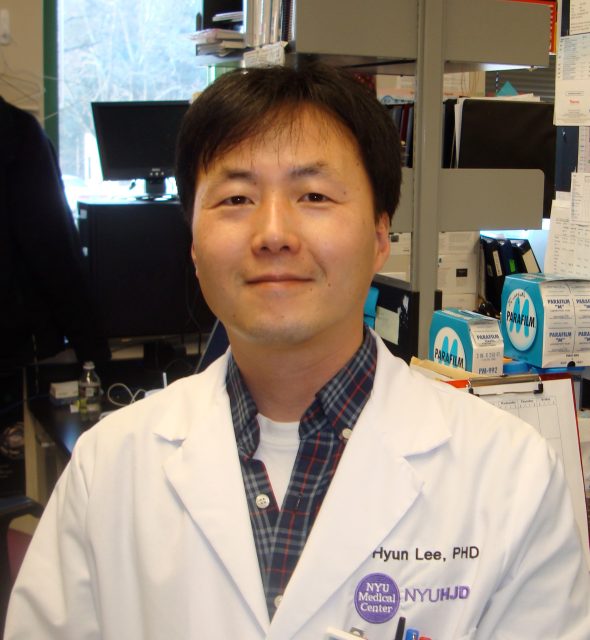Research

Research Scientist, Center for Dementia Research
Ju-hyun.lee@nki.rfmh.org
Assistant Professor, Department of Psychiatry
NYU Grossman School of Medicine
Lee NYU Page
Ju-hyun.lee@nyulangone.org
Leej35@nyu.edu
Lee Lab
Autophagy-lysosome Pathway in Neurodegenerative Disease, Including Alzheimer’s Disease
Dr. Ju-Hyun Lee has been extensively involved in analyses of Autophagy and the pathology of endosomal-lysosomal system changes in relation to neurodegeneration using both in vitro and in vivo in Alzheimer’s disease (AD) models, and postmortem AD human brain. The Lee Lab conducts studies at the cellular level to identify the early lysosomal acidification (pH) changes in neurons that lead to the onset and progression of AD and identified changes in one of the surveillance systems inside neurons, known as autophagy, that underlie the functional alterations in the brain of AD patients. Moreover, research in his lab is providing fundamental insights into the regulation of Autophagy-lysosome pathway (ALP) in vivo in neurons and holds exceptional promise for understanding how ALP dysfunction propels amyloid pathology in Alzheimer’s disease. The further potential for accelerating translational studies of ALP modulators as therapeutic agents in neurological disorders fulfills an additional, urgent, need in the ALP alteration-mediated neurodegeneration field.
Research Interests
I have a broad background in neuroscience, with specific training and expertise in cellular and molecular mechanism of neurodegenerative disorders, especially Alzheimer’s disease. As a research fellow at Nathan Kline Institute and department of psychiatry NYU Langone medical center, I have been extensively involved in analyses of autophagy and the pathology of the endosomal-lysosomal system changes in relation to neurodegeneration using in vivo Alzheimer’s disease (AD) animal models. As part of the Center for Dementia research team at Nathan Kline Institute, I am conducting studies at the cellular level to identify the early changes in neurons that lead to the onset and progression of AD. I have identified changes in one of the surveillance systems inside neurons, known as autophagy, that underlie the functional alterations in the brain of AD patients. The current goal of my research is to perform a complete molecular dissection of those changes with the idea of developing novel therapeutics that could slow down the progression of the disease or even prevent it. Consequently, my studies will have a significant impact on improving public health care for neurodegenerative diseases, particularly with regards to AD.
Education
B.Sc. School of Art & Science, Inha University, Republic of Korea
M.M. School of Medicine, Inha University, Republic of Korea
Ph.D. Institute of Psychiatry, Psychology & Neuroscience, King’s College London, United Kingdom
Awards and Honors
2019 KSEA Northeast Reginal Conference Program Chair
2010 Travel Fellowship (International Conference on Alzheimer’s Disease
2000-2004 European Union Ph.D. Fellowship Award
1999 Korean Science & Engineering Foundation Research Fellowship Award
1996 Inha University School of Medicine Research Assistant Fellowship Award
